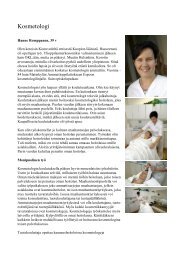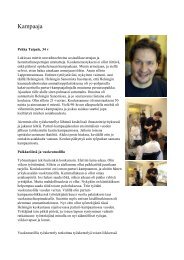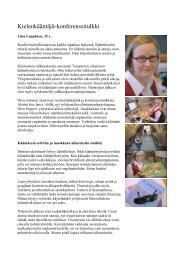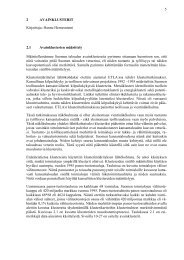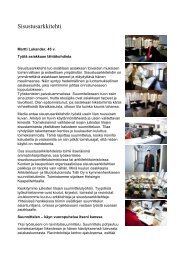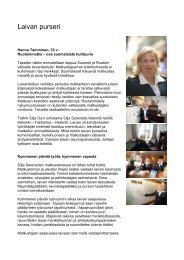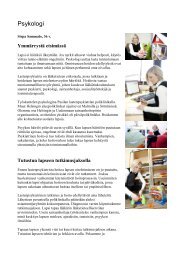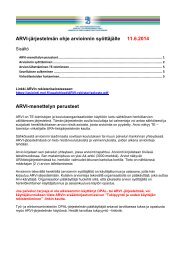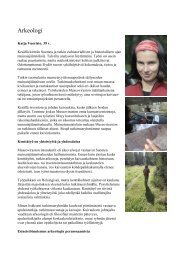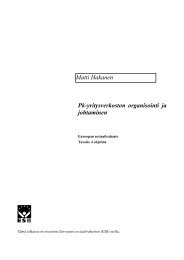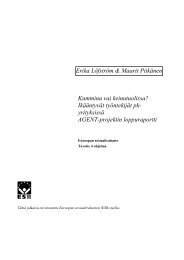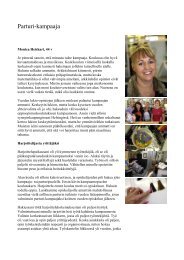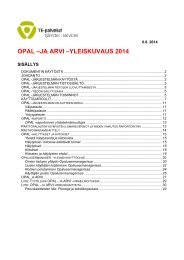Working Life Barometer in the Baltic Countries 2002 (pdf) - mol.fi
Working Life Barometer in the Baltic Countries 2002 (pdf) - mol.fi
Working Life Barometer in the Baltic Countries 2002 (pdf) - mol.fi
Create successful ePaper yourself
Turn your PDF publications into a flip-book with our unique Google optimized e-Paper software.
263<br />
<strong>the</strong> men has grown only a little; but for <strong>the</strong> women, <strong>the</strong>re has been a dramatic<br />
rise <strong>in</strong> work<strong>in</strong>g hours. Women <strong>in</strong> <strong>the</strong> private sector did an average work<strong>in</strong>g<br />
week of as many as 46.8 hours, which is greater than <strong>the</strong> correspond<strong>in</strong>g <strong>fi</strong>gure<br />
for men <strong>in</strong> Lithuania and greater than for any o<strong>the</strong>r women's group under<br />
comparison <strong>in</strong> <strong>the</strong> <strong>Baltic</strong> countries.<br />
In Lithuania, as <strong>in</strong> Latvia, 39 % of <strong>the</strong> work<strong>in</strong>g people stated that overtime<br />
was part of <strong>the</strong>ir normal work<strong>in</strong>g week. Overtime is done quite commonly, but<br />
often no separate compensation is received for it, <strong>in</strong> money any more than <strong>in</strong><br />
days off. Almost three-quarters of <strong>the</strong> women who work overtime do not receive<br />
compensation of any k<strong>in</strong>d for it. The men's situation is better, but not<br />
good. Of those men who do overtime, slightly over half receive no separate<br />
compensation for it. Around one-quarter of all work<strong>in</strong>g people <strong>in</strong> Lithuania do<br />
unpaid overtime dur<strong>in</strong>g a normal work<strong>in</strong>g week; this proportion is greater than<br />
<strong>in</strong> <strong>the</strong> o<strong>the</strong>r countries compared.<br />
Taken as a whole, <strong>the</strong> liv<strong>in</strong>g standard of Lithuania's work<strong>in</strong>g people can be<br />
estimated to have rema<strong>in</strong>ed more or less <strong>the</strong> same dur<strong>in</strong>g <strong>the</strong> last few years.<br />
Emerg<strong>in</strong>g as a positive feature is <strong>the</strong> salary difference between <strong>the</strong> genders,<br />
which is <strong>the</strong> smallest <strong>in</strong> <strong>the</strong> <strong>Baltic</strong> countries. When <strong>in</strong>clud<strong>in</strong>g <strong>the</strong> total of all<br />
<strong>the</strong> net earn<strong>in</strong>gs received from one or more jobs, <strong>the</strong> gap between men's and<br />
women's salaries has def<strong>in</strong>itely narrowed <strong>in</strong> recent years, be<strong>in</strong>g 17 % at present.<br />
In <strong>the</strong> preced<strong>in</strong>g survey, <strong>the</strong> difference was 24 %. This reduced salary<br />
difference is largely because <strong>the</strong> average salaries <strong>in</strong> <strong>the</strong> public sector have<br />
clearly grown more than <strong>in</strong> <strong>the</strong> private sector. S<strong>in</strong>ce a majority of <strong>the</strong> female<br />
workers are <strong>in</strong> <strong>the</strong> public sector, this positive salary development <strong>in</strong> <strong>the</strong> sector<br />
has contributed directly to <strong>the</strong> narrow<strong>in</strong>g of <strong>the</strong> gap between <strong>the</strong> salaries of<br />
male and female workers.<br />
The black economy has become more widespread <strong>in</strong> recent years, among both<br />
men and women. This may be l<strong>in</strong>ked to <strong>the</strong> <strong>in</strong>creased <strong>in</strong>cidence of secondary<br />
jobs. In Lithuania, as also <strong>in</strong> Estonia and Latvia, 15 % of <strong>the</strong> wage earners said<br />
that <strong>the</strong>y had ano<strong>the</strong>r job <strong>in</strong> addition to <strong>the</strong>ir ma<strong>in</strong> one. The proportion do<strong>in</strong>g a<br />
second job <strong>in</strong> Lithuania is now almost double that observed <strong>in</strong> <strong>the</strong> previous<br />
study. The change has concerned men as much as women. One explanatory<br />
factor is that delays <strong>in</strong> salary payment have become more common. It is probable<br />
that for many, do<strong>in</strong>g a secondary job is essential to <strong>the</strong>ir livelihood when




